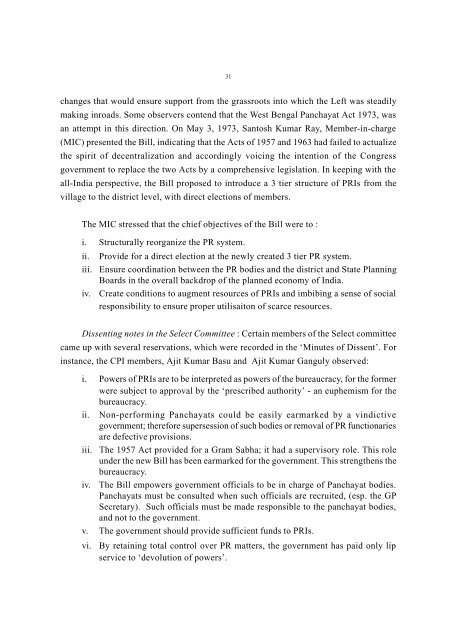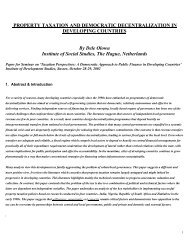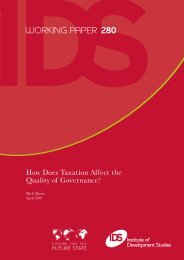View Article - Institute of Development Studies
View Article - Institute of Development Studies
View Article - Institute of Development Studies
Create successful ePaper yourself
Turn your PDF publications into a flip-book with our unique Google optimized e-Paper software.
31changes that would ensure support from the grassroots into which the Left was steadilymaking inroads. Some observers contend that the West Bengal Panchayat Act 1973, wasan attempt in this direction. On May 3, 1973, Santosh Kumar Ray, Member-in-charge(MIC) presented the Bill, indicating that the Acts <strong>of</strong> 1957 and 1963 had failed to actualizethe spirit <strong>of</strong> decentralization and accordingly voicing the intention <strong>of</strong> the Congressgovernment to replace the two Acts by a comprehensive legislation. In keeping with theall-India perspective, the Bill proposed to introduce a 3 tier structure <strong>of</strong> PRIs from thevillage to the district level, with direct elections <strong>of</strong> members.The MIC stressed that the chief objectives <strong>of</strong> the Bill were to :i. Structurally reorganize the PR system.ii. Provide for a direct election at the newly created 3 tier PR system.iii. Ensure coordination between the PR bodies and the district and State PlanningBoards in the overall backdrop <strong>of</strong> the planned economy <strong>of</strong> India.iv. Create conditions to augment resources <strong>of</strong> PRIs and imbibing a sense <strong>of</strong> socialresponsibility to ensure proper utilisaiton <strong>of</strong> scarce resources.Dissenting notes in the Select Committee : Certain members <strong>of</strong> the Select committeecame up with several reservations, which were recorded in the ‘Minutes <strong>of</strong> Dissent’. Forinstance, the CPI members, Ajit Kumar Basu and Ajit Kumar Ganguly observed:i. Powers <strong>of</strong> PRIs are to be interpreted as powers <strong>of</strong> the bureaucracy, for the formerwere subject to approval by the ‘prescribed authority’ - an euphemism for thebureaucracy.ii. Non-performing Panchayats could be easily earmarked by a vindictivegovernment; therefore supersession <strong>of</strong> such bodies or removal <strong>of</strong> PR functionariesare defective provisions.iii. The 1957 Act provided for a Gram Sabha; it had a supervisory role. This roleunder the new Bill has been earmarked for the government. This strengthens thebureaucracy.iv. The Bill empowers government <strong>of</strong>ficials to be in charge <strong>of</strong> Panchayat bodies.Panchayats must be consulted when such <strong>of</strong>ficials are recruited, (esp. the GPSecretary). Such <strong>of</strong>ficials must be made responsible to the panchayat bodies,and not to the government.v. The government should provide sufficient funds to PRIs.vi.By retaining total control over PR matters, the government has paid only lipservice to ‘devolution <strong>of</strong> powers’.





